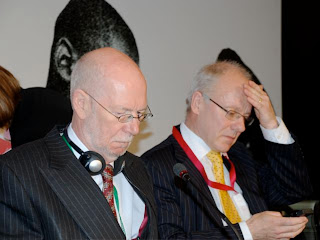Today, the new Cluster Munition Convention banning cluster munitions that cause unacceptable harm to civilians was adopted by the Dublin Conference at around 10h10. There were no objections expressed from the floor.
A great number of delegations spoke to welcome the new treaty, which will enter into force internationally six months after 30 states have ratified or acceded to it. Given the speed at which the 1997 Anti-Personnel Mine Ban Convention entered into force internationally almost a decade ago and the energy and commitment expressed in the conference chamber today, this may not take long.
The final version of the treaty in English, French and Spanish should be available on the Dublin Conference website shortly, in addition to the Conference's procedural report.
A couple of points stood out from the plethora of closing statements. The Ambassador of France said the Dublin Conference had been the most successful diplomatic conference he had taken part of in his career. I suspect many others - especially those involved in multilateral disarmament over the last decade - would agree.
Iceland's representative, a noted international legal scholar, set out his views on interoperability, which will be worth further careful study in the course of implementation of the new treaty, especially its Article 21. Of course, the United Nations, International Committee of the Red Cross and Cluster Munition Coalition (CMC) spoke to welcome the new treaty, and the CMC presented its implementation action plan to Norway's Deputy Minister of Defence, who spoke along with Ireland's Minister of Foreign Affairs.
But Norway's working head of delegation and a key figure in the Oslo Process, Ambassador Steffen Kongstad, summed up the feelings of many when he noted that although "a moment of joy and gratitude" in practical terms, implementation of the treaty starts today. Moreover, he described the Cluster Munition Convention, and the Oslo Process leading to it as "disarmament as humanitarian action".
Those of us associated with UNIDIR's project on 'Disarmament as humanitarian action: Making Multilateral Negotiations Work' couldn't agree more. It is an historic day, indeed.
John Borrie
Photograph by John Borrie. Ambassador Dáithí O'Ceallaigh, President of the Dublin Conference, and its Secretary-General Colm Ó Floinn, prepare to open today's closing ceremony.
Friday, 30 May 2008
Cluster Munition Convention: "Disarmament as humanitarian action"
Posted by Disarmament Insight at 14:34
Labels: CCM, Cluster Munition Coalition, Convention on Cluster Munitions, Disarmament as Humanitarian Action, Dublin Conference, Oslo process






3 comments:
Yes, it's fantastic news, John. Now, of course, begins the long and winding road of implementation. But it's a good start.
Great news, and great work. Thanks for the play-by-play throughout the process.
Great news, and great work. Thanks for the play-by-play throughout the process.
Post a Comment